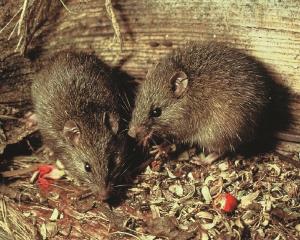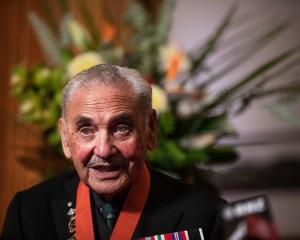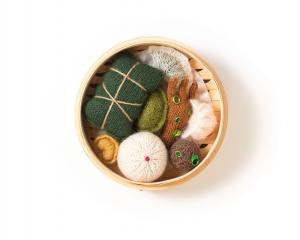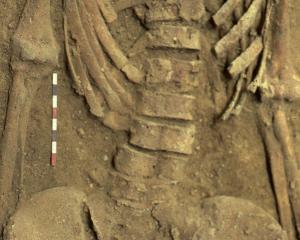August 15, 1945, was the day news reached New Zealand that Japan had surrendered and World War 2 was over. For merchant seaman Lou Barron, the surrender came just in time.
In a series of emails to Otago Daily Times journalist Mark Price, Mr Barron (86), now of Dunedin, recounted how he came to be a Japanese prisoner of war in the notorious Changi Jail. Today, in the final part of his story, he recalls his release.
By about May 1945, we had heard of the victory in Europe and also things were going bad for the Japanese. They had started other working parties, digging trenches and tunnels because they knew that Malaya and Singapore would be invaded by the Allies.
The trenches were a change from working on the airstrips and we could get near the local people and get some extra food.
It was very dangerous if caught, but being hungry, we took the chances.
I remember on one party that I was on, on the way back to the jail we were passing a Malay village. We had one guard. He was very young and not very big.
In fact, his rifle and bayonet were bigger than him.
As we passed the big garden there were a lot of tapioca plants growing. So we said to the guard "OK tapioca dig?". He nodded his head so in we go, digging the roots out.
Then we heard a lot of yelling.
Lo and behold there were a couple of the locals running towards us with big sticks. We thought the guard would stop them with his rifle and bayonet.
But he had taken off. So did we - minus the roots.
Then one day we got a very nice surprise - American bombers flying overhead. That is when they started to bomb Singapore.
We knew the Japanese were losing the war, but the Japanese were getting a lot worse, demanding more work from us POWs. It would be about July 1945 that I was on a working party digging tunnels.
On this particular day, there were six of us detailed for this tunnel.
When we got into the tunnel a bit, we would go slow. But the guards came in screaming "Speedo, Speedo".
The head guard told us we were not working fast enough. Then he took to us with his bamboo cane and gave us a belting.
The Japanese with swords would wave the sword in front of us more or less to intimidate us.
It was on one of these working parties - little did we know it was to be our last one - at midday the head guard said we were to return to the jail.
We thought this was a bit strange. When we marched into the jail, someone said the war was over, but it took some believing.
We were then told by an army officer to stay in the jail. It would be three or four days later that planes flew over dropping leaflets telling us to stay in the camp. Help was on the way.
The next big thing to happen, the planes came back and they dropped about fifty British paratroopers. They were to keep us from breaking out. All the guards had disappeared.
Then they sent in medical teams. They told us to be careful of what we ate and not to overeat.
They worked wonders. In no time they had fixed up more showers.
We got sprayed with something, then into the showers and given shorts, a shirt and sandshoes. I think they burnt all the old gear.
Then they gave us a medical going over [there were still POWS dying, but life was getting very hectic].
I was six and a-half stone (41.8kg). My normal weight was 10 stone (63kg).
We were in for another surprise.
The Royal Navy had sent the cruiser HMS Sussex into Singapore.
The navy sent some trucks up to the jail and loaded us merchant navy and navy guys into the trucks and took us down to the ship.
We went aboard and the next thing some of the sailors took hold of us. I was with one of my mates, Tommy Davies, who was semi-blind through malnutrition. I was kind of looking after him.
Anyhow the sailors took us down to the mess deck and said they was going to look after us and give us a good feed.
On the messroom table was a big loaf of bread and a large tin of plum jam. I said to Tommy, "how about some bread and jam?"
He said, "bloody oath."
It was the first bread we had seen for nearly three and a-half years. The sailors could not do enough for us.
They gave us a feed of chips, eggs and bacon, but it was a bit too much for our stomachs.
They gave cigarettes, chocolate and other toilet gear.
Next day they took us back to the jail.
Then Lord Louis Mountbatten arrived at the jail. I did manage to catch a glimpse of him.
The very next surprise was, I was lucky enough to be drafted on to the first ship to arrive take us home - the New Zealand ship SS Monowai.
I must mention that if it had not been for the atom bomb, I and many POWS would not have survived very much longer. The Japanese threatened to kill all the POWS if they had to face an invasion by the Allies. But even so, we were getting into a very poor state of health.
Our morale was still pretty good, so we did survive.
As we boarded the Monowai in Singapore, we saw some British soldiers in charge of a working party of Japanese prisoners working on the wharf. We sang out "give it to them".
We left Singapore about the second week in September 1945, bound for Ceylon (Sri Lanka).
This would have to be the best trip that I ever had in all my time at sea.
They treated us like royalty, the Red Cross nurses and the crew. Nothing was any trouble to them.
We arrived in Colombo and they took us ashore. We had some Wrens who were going back to the UK, so a couple of them teamed up with us merchant navy guys.
They took us to a service club where we had a few beers and lunch. The beer did not take long to take effect and we got into a very happy mood. It was a very pleasant day.
Then back to the ship, which set sail for the Suez Canal.
The nurses kept weighing us and we were on different pills, and the food was very good indeed.
Most of the nurses were New Zealanders.
The Best Day of My Life.
After going through the Suez Canal we sailed across the Mediterranean Sea, bound for Gibraltar and then Liverpool. At this time we were able to send a cablegram home.
Having received no word from home, I did not know if things were OK there.
My mother knew that I was alive, because the Red Cross people were keeping her informed of what was happening.
Heading for Liverpool we started to get a bit excited. We had left the lovely calm seas and warm weather.
My mates and I were standing on deck as we sailed up the River Mersey. We came in sight of the Liver Buildings.
One of my mates said, "Lou, that was supposed to be a three-month trip. It turned out to be a three and a-half year trip."
I think there was a few little sobs.
As we pulled alongside the Liverpool pierhead landing stage there were flags flying, bands playing and there were thousands of people. We were overcome with the sight.
As we disembarked the six of us merchant navy guys were taken to a shed and they told us that we were to be taken to a rehab camp on the other side of the river to Birkenhead, not far from where I lived.
"Anyhow," I said to one of the Red Cross women, "can I get home?"
She said "very soon".
So she came back later and told me she was taking me home.
She had already got a message to my mother that I was on my way. In those days we did not have a telephone.
So after a 15-minute drive we drove up the street, and there was not a soul in sight.
But I did see a big "welcome home Lou" sign as I got out of the car. My mother came out of the house, crying. Me too. I was home.
What do I think of the Japanese now?b Well, this is a far different Japan now.
I have no hate for them now, it does no good to hate people. If you had asked me this question in 1945, it would have been different .
As for VJ Day, yes, we should always remember those people who went through the war, but there are no winners in a war.
The younger generation should be told of the history.












